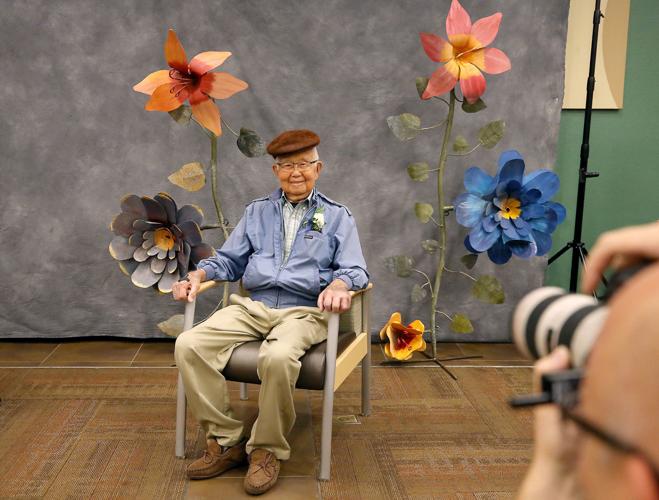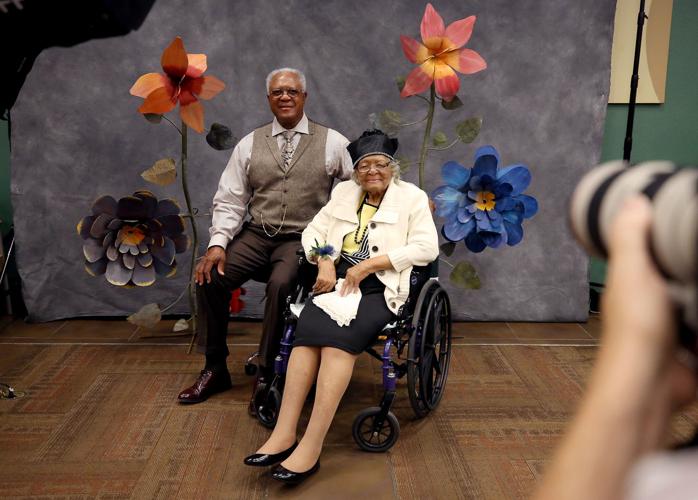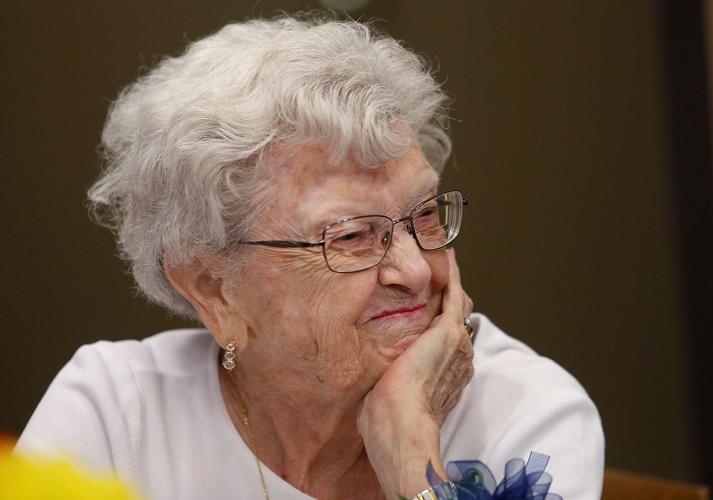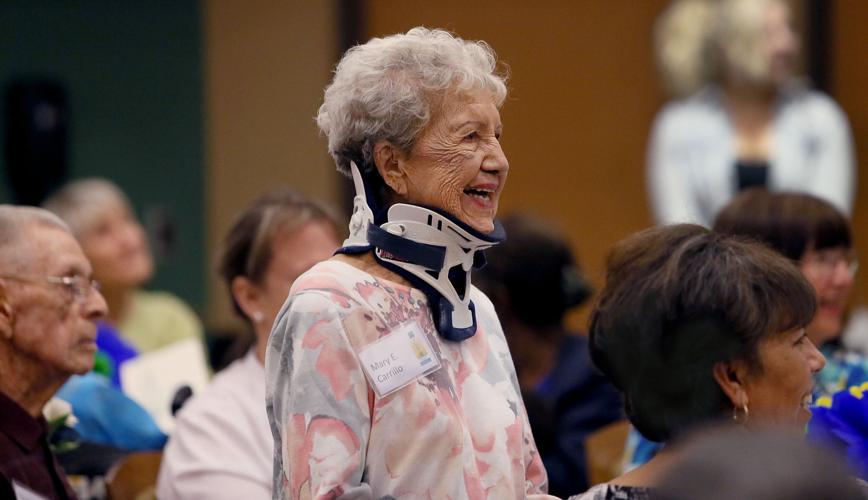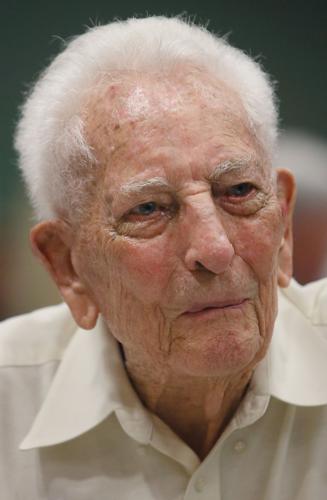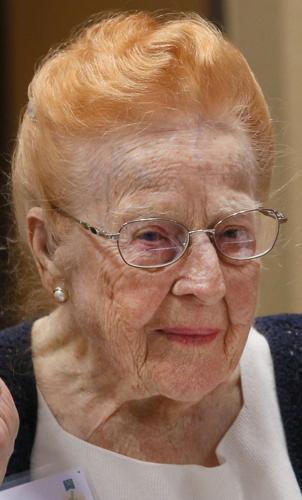Before Tucson Medical Center’s Friday morning centenarian celebration, 99-year-old Don Davis went for a 40-minute bike ride through his neighborhood, like he does every day.
“He’s religious about it,” said his nephew, Bill Griffin, who attended the hospital’s 30th annual “Salute to Centenarians” with Davis.
“I do it because I can,” smiled Davis, a cheerful military veteran who served in World War II and the Korean War and as a child acted in silent films in his hometown of Hollywood, California.
Forty-three Tucson-area residents who were born in 1917 or earlier attended Friday’s event. Organizers said they may need more space for future parties. Not only are they finding a growing number of people reaching 100, but as a group, the centenarians are increasingly active, engaged and more than well enough to attend.
The group was born before or during World War I, before “The Star Spangled Banner” was officially designated as the national anthem and before women in the U.S. were allowed to vote.
Still working
Some still live on their own. A few came in walkers and wheelchairs, but others walked in without assistance. Helen Musselman, who turns 100 next month, still goes to work five days a week at Musselman Honda Center, a business she opened with her husband more than 50 years ago. Honda Motor Co. made a video about Musselman last year called “Helen on Wheels.”
“People always think I am in my 70s or 80s,” laughed Musselman, who got a new heart valve last year with no problems. She attended the event with her great-granddaughter, Shaunna Kingsley, who is 32.
A prosthetic leg Musselman got in 2007 requires her to use a cane. But she’s otherwise nimble, hears well and loves working with younger generations at her family business. She uses a stationary bicycle to ride four miles every day and likes to have half a Coors Light beer once a week.
A lot of the centenarians said a daily or occasional drink was part of their routine. Davis enjoys a martini — gin, straight up with one olive — on his patio every evening. Claire Beers, 100, who cleans her house daily and cooks eggs and toast every morning, enjoys a glass- and-a-half of wine with, and after, dinner.
Alan Winner, who turns 100 on May 21, told the Star that he takes no medications — a fact confirmed by his 92-year-old wife, Sylvia , who came to the event with him. Winner also credits his longevity to the fact that he has never taken a single puff of a cigarette.
Old, not sick
People who live exceptionally long lives appear to have the additional benefit of shorter periods of illness — sometimes just weeks or months — before death, a study of nearly 30,000 people published last year by researchers from Yeshiva University in the Journal of the American Geriatrics Society found.
While most people struggle with an increasing burden of disease and disability as they age, the researchers found that with centenarians, there a consistent pattern of delayed onset of illness when measured against comparison groups ranging in age from 58 to 95. The researchers said the findings contradict the notion that the older people get, the sicker they become and the more it costs to take care of them.
Organizers from Tucson Medical Center and the Pima Council on Aging say they identified 109 centenarians in Pima County after doing heavy outreach through seniors organizations and various assisted-living facilities.
Most of the attendees were women, which matches national trends of centenarians. The ages of those who attended at this year’s event ranged from 99 to 108-year-old Carmen Acevedo, who attends every year. Acevedo was born on a ranch in Amado when Arizona was not yet a state. She gardens, exercises and says a sense of humor has helped her stay young.
“They are engaged and active, and that is what keeps them healthy,” said Maya Luria, director of Senior Services at TMC. “This year we asked them all what they do to stay young at heart. A lot talked about a sense of humor, church, friends and intergenerational relationships — there is something to be said for having that.”
Sculpting, gardening
Most have hobbies, whether it’s arts and crafts, going to the casino or watching old movies. Many took up new careers or learned new skills later in life. Hattie Harris, now 103, had her own weekly television show called “Open Truth” on Access Tucson when she was in her 80s and 90s. She still likes to play gospel music on the piano and goes to church.
When she was in her 60s, Yeta B. Weston became a fine stone sculptor and used power tools to work with large blocks of marble and granite. Now 101, her only major concession to age is that she’s stopped wearing high heels.
Takashi Yamashita, who turns 100 in December, says his magic word is “flush,” which means keeping your body, mind and attitude free of toxins. Yamashita has worked outdoors all his life — farming, making bonsai trees and landscaping.
The event included a video and slide show of centenarians. The song “Ain’t Misbehavin’” was included, and a few of the attendees quietly sang with the music.
“You remind us to celebrate life each day,” Tucson Mayor Jonathan Rothschild told the group in a videotaped message.
And celebrate they do. When they called her name, a smiling 99-year-old Julia A. Newman popped out of her chair and proudly waved her centenarian paddle to let organizers know where she was sitting.
Newman loves sports (especially the University of Arizona Wildcats), going to the casino and, until she was 97, cuddled hospitalized babies in the neonatal intensive care unit at Banner-University Medical Center Tucson. She spent 38 years volunteering with Meals on Wheels and is hoping to co-pilot with her daughter if her daughter starts driving for the program again.
Newman survived getting run over by a tractor when she was 80, and a stroke when she was 95 that initially affected her speech. But she’s got no problem talking now.
Her advice for having good quality of life? Have a goal every day, and try to do it.
Don Davis said he doesn’t have any particular secret, though he does eat a salad each day and feels guilty if he has dinner without one. He reads a lot, including Popular Mechanics and National Geographic, and in the evenings likes to relax and solve the problems of the world, he said.
The only disability he can think of is soreness in his knees.
“He is positive and appreciative, always,” his nephew, Bill Griffin, said.
“I haven’t made a single meal that he didn’t appreciate. He’s always grateful and giving thanks to someone. He’s very optimistic.”


